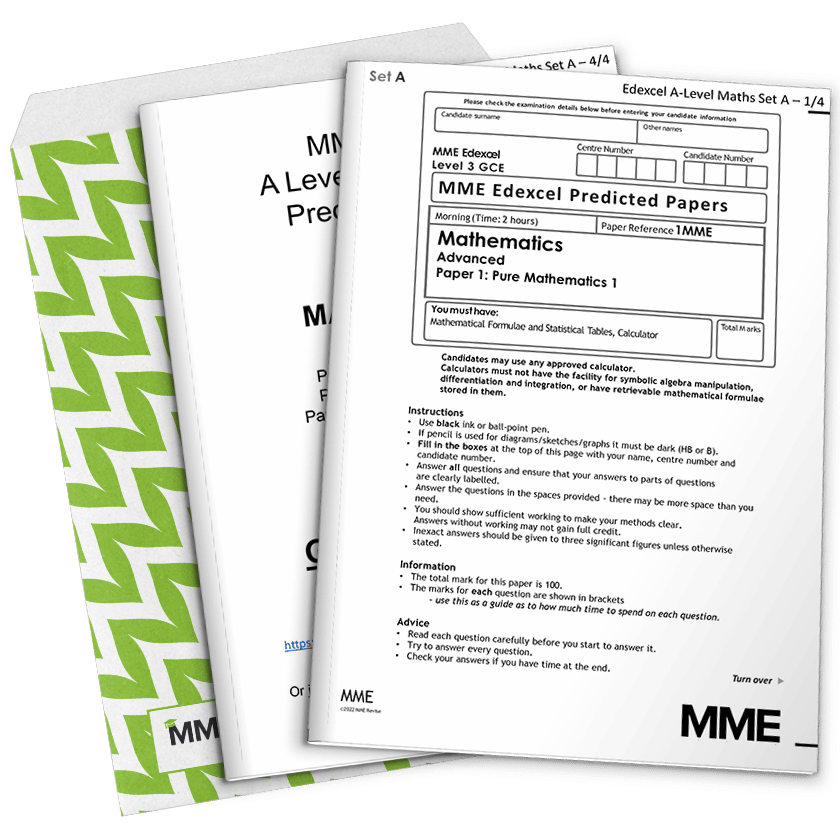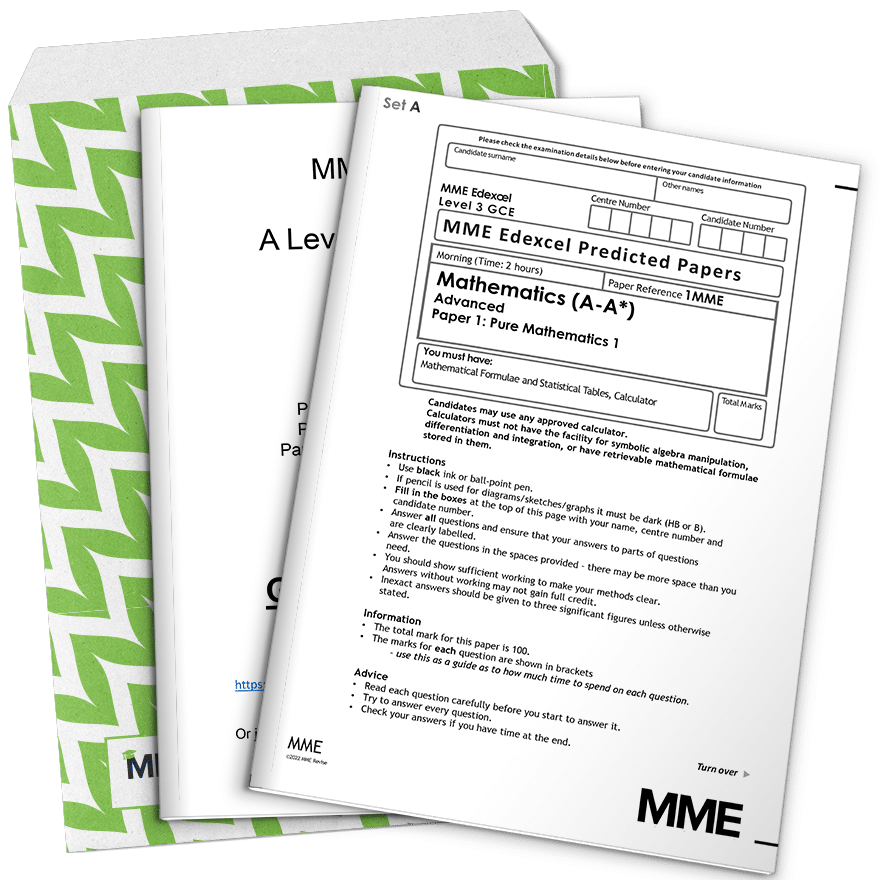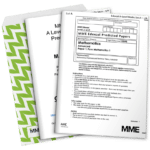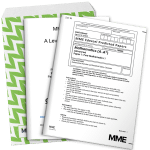Reverse Chain Rule
Reverse Chain Rule Revision
Reverse Chain Rule
The chain rule allows us to differentiate in terms of something other than x, and we end up with a product of two derivatives.
We can do this in reverse to integrate complicated functions where a function and its derivative both appear in that which is to be integrated.
The Reverse Chain Rule
Recall: The chain rule.
\dfrac{dy}{dx}=\dfrac{dy}{dt}\dfrac{dt}{dx}
Now the reverse chain rule:
{\LARGE \int}\dfrac{du}{dx}f'(u)dx=f(u)+c
The easiest way to spot when to use this is to look for a function and its derivative.
Look for a Function and Its Derivative
Some general results from the reverse chain rule appear so frequently that they are worth remembering.
{\LARGE \int}(n+1)f'(x)(f(x))^{n}dx=(f(x))^{n+1}+c
The multiple in the integral is n+1, not n, which is very important to note.
Example 1: Reverse Chain Rule
Find the integral of 2\cos(2x)e^{\sin(2x)}
[2 marks]
\dfrac{d}{dx}(\sin(2x))=2\cos(2x) so our integral is of the form {\LARGE \int}\dfrac{du}{dx}f'(u)dx where f'(u)=e^{u}. Hence:
\int2\cos(2x)e^{\sin(2x)}dx=e^{\sin(2x)}+c
Example 2: A Function and its Derivative
Find \int\dfrac{4}{x}(\ln(x))^{3}dx
[2 marks]
Since \dfrac{d}{dx}(\ln(x))=\dfrac{1}{x}, this is of the form \int(n+1)f'(x)(f(x))^{n}dx where n=3 and f(x)=\ln(x). Hence:
{\LARGE \int}\dfrac{4}{x}(\ln(x))^{3}dx=(\ln(x))^{4}+c
Reverse Chain Rule Example Questions
Question 1: Integrate:
i) 3x^{2}e^{x^{3}}
ii) 4x^{7}\left(\dfrac{1}{2}x^{8}+4\right)^{2}
iii) x^{2}\cos\left(\dfrac{1}{3}x^{3}\right)
[9 marks]
i) \dfrac{d}{dx}(x^{3})=3x^{2} so this is in reverse chain rule form. Hence:
\begin{aligned}\int3x^{2}e^{x^{3}}dx=e^{x^{3}}+c\end{aligned}
ii) \dfrac{d}{dx}\left(\dfrac{1}{2}x^{8}+4\right)=4x^{7} so this is in reverse chain rule form. Hence:
\begin{aligned}\int4x^{7}\left(\dfrac{1}{2}x^{8}+4\right)^{2}dx=\dfrac{1}{3}\left(\dfrac{1}{2}x^{8}+4\right)^{3}+c\end{aligned}
iii) \dfrac{d}{dx}\left(\dfrac{1}{3}x^{3}\right)=x^{2} so this is in reverse chain rule form. Hence:
\begin{aligned}\int x^{2}\cos\left(\dfrac{1}{3}x^{3}\right)dx=\sin\left(\dfrac{1}{3}x^{3}\right)+c\end{aligned}
Question 2: Integrate:
i) 12x^{3}e^{x^{4}}
ii) \dfrac{2}{x}(\log(x))^{5}
iii) 4\sec^{2}(x)e^{\tan(x)}
[9 marks]
i) \dfrac{d}{dx}(x^{4})=4x^{3} so this is in reverse chain rule form. Hence:
\begin{aligned}\int12x^{3}e^{x^{4}}dx&=3\int4x^{3}e^{x^{4}}dx\\[1.2em]&=3e^{x^{4}}+c\end{aligned}
ii) \dfrac{d}{dx}(\log(x))=\dfrac{1}{x} so this is in reverse chain rule form. Hence:
\begin{aligned}\int\dfrac{2}{x}(\log(x))^{5}dx&=2\times\dfrac{1}{6}(\log(x))^{6}+c\\[1.2em]&=\dfrac{1}{3}(\log(x))^{6}+c\end{aligned}
iii) \dfrac{d}{dx}(\tan(x))=\sec^{2}(x) so this is in reverse chain rule form. Hence:
\begin{aligned}\int4sec^{2}(x)e^{\tan(x)}dx=4e^{\tan(x)}+c\end{aligned}
Question 3: Integrate:
i) (6x^{2}+12x+2)e^{x^{3}+3x^{2}+x+5}
ii) (12x+4)(3x^{2}+2x+9)^{6}
iii) 19\cosec^{2}(3x)\cot^{12}(3x)
[9 marks]
i) \dfrac{d}{dx}(x^{3}+3x^{2}+x+5)=3x^{2}+6x+1 so this is in reverse chain rule form. Hence:
\begin{aligned}&\int(6x^{2}+12x+2)e^{x^{3}+3x^{2}+x+5}dx\\[1.2em]&=2\int(3x^{2}+6x+1)e^{x^{3}+3x^{2}+x+5}dx\\[1.2em]&=e^{x^{3}+3x^{2}+x+5}+c\end{aligned}
ii) \dfrac{d}{dx}(3x^{2}+2x+9)=6x+2 so this is in reverse chain rule form. Hence:
\begin{aligned}&\int(12x+4)(3x^{2}+2x+9)^{6}dx\\[1.2em]&=2\int(6x+2)(3x^{2}+2x+9)^{6}dx\\[1.2em]&=2\times\dfrac{1}{7}(3x^{2}+2x+9)^{7}+c\\[1.2em]&=\dfrac{2}{7}(3x^{2}+2x+9)^{7}+c\end{aligned}
iii) \dfrac{d}{dx}(\cot(x))=-\cosec^{2}(x) so this is in reverse chain rule form. Hence:
\begin{aligned}&\int19\cosec^{2}(3x)\cot^{12}(3x)dx\\[1.2em]&=-19\int-\cosec^{2}(3x)\cot^{12}(3x)dx\\[1.2em]&=-19\times\dfrac{1}{3}\times\dfrac{1}{13}\cot^{13}(3x)+c\\[1.2em]&=-\dfrac{19}{39}\cot^{13}(3x)+c\end{aligned}










